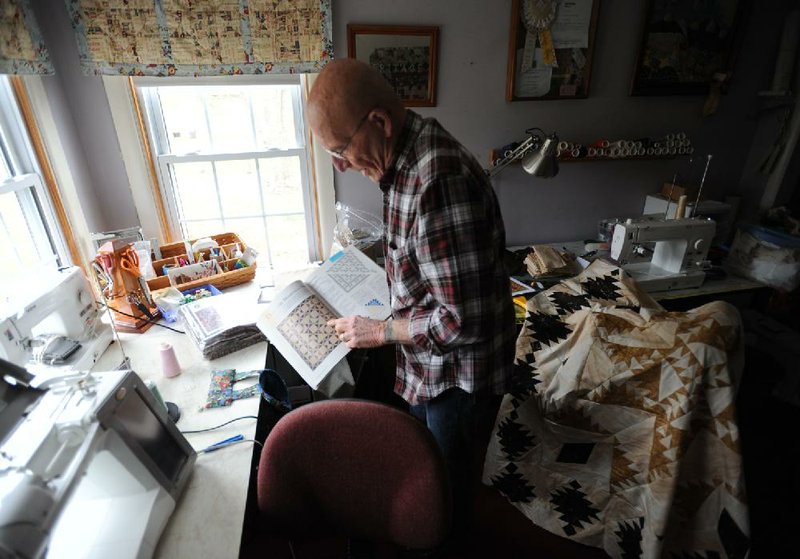ELKINS - Jerry Patnoe started quilting nearly 20 years ago, when his former wife died, so he’d have quilts to pass down to his grandchildren.
He’s spent many a day at his sewing machine, piecing together his own designs, even on days when shaky hands make it difficult to feed fabric under the moving needle. Besides the tremors, Parkinson’s disease has also affected Patnoe’s balance, speech and cognitive skills.
“It’s extremely frustrating,” said Patnoe, 71. He was once able to figure measurements and sizes easily in his head, now he sometimes has to draw it out on paper first.
“It drives ya nuts,” he added.
Four Star General, a block of four brightly colored stars that Patnoe created years ago, was used as the April artwork in the 2013 Creativity & Parkinson’s Calendar. For quilters in the know, the pattern is known as the LeMoyne Star design. A personalized message in the middle declares: “I may have Parkinson’s but I still do it my way!”
“To me, that’s a real statement about me and what the hell is going on here,” he said,looking at the block and its clever use of nontraditional color placement. “When I get done with something, I like it to have some personal meaning, as well as technique.”
April is National Parkinson’s Awareness Month, and Patnoe also happens to share his April 11 birthday with James Parkinson (1755-1824).
Parkinson was an English apothecary surgeon, paleontologist and the first to identify “paralysis agitans,” a condition that would later be renamed Parkinson’s. Patnoe is one of nearly 1 million people in the United States and 7 million to 10 million people worldwide living with Parkinson’s, according to statistics provided by the Parkinson’s Disease Foundation.
“We selected Dr. Patnoe’s quilt panel to be featured in the month of April because it aptly captures the spirit of Parkinson’s Awareness Month,” said Robin Elliott, the foundation’s executive director. “The message of hope he displays in his colorful quilt panel will surely inspire others who are finding ways to fight Parkinson’s disease.”
His work was one of 13 selected for the calendar from more than 300 entries, chosen after three rounds of competitive selection then a vote by a committee of volunteers, staff and graphic designers. Once the top 13 works are chosen, the foundation asks the Parkinson’s community to choose the calendar’s cover image through an online vote.
Before Patnoe’s piece was included in the calendar, it was featured in a 2010 quilt project for Parkinson’s. The idea for the 600-block quilt was hatched from the sprawling, world record-holding AIDS Memorial Quilt.
Patnoe was diagnosed with Parkinson’s in 2005, when he was director of the criminal justice program at the University of Arkansas. He taught classes in both criminal justice and sociology until he retired in 2007.
The Patnoes don’t talk about where Jerry is in his journey with the diseases. There’s no need to go into it, he said.
“It’s degenerative,” he said. “I will never get better, and over time, I will always get worse.
“So discussions of my progress don’t mean a lot.”
He said he has periods where his symptoms appear to level out or get better, often followed by a downturn.
“Over time, the downturns add up [to be] more than the little glitches upward,” Patnoe said.
“Basically, we wake up in a new world every day,” said his wife, Sharon Patnoe, Jerry’s mate of 18 years and wife of 15. They were born in towns 80 miles apart in Illinois, but they met and married in Arkansas. Together, they have six grown children.
Jerry said he is “anti-medication,” taking as few drugs as possible. He’s now down to two: the Exelon patch for dementia associated with Parkinson’s and Sinemet, which helps manage his symptoms. Exelon is also used to treat mild to moderate Alzheimer’s disease.
He quit one drug he was taking because he said it fostered some compulsive behaviors. He was playing the popular real-time farm simulation game FarmVille day and night, Sharon said. The game is available as an application on the social-networking website Facebook.
So rather than cultivating a fake farm, he’ll dig into quilting for now, logging 6 to 8 hours a week behind the machine.
At first, he was proud to have just completed a quilt. “Anymore it’s become a direct expression and statement about who I am,” he said.
Northwest Arkansas, Pages 7 on 04/04/2013

